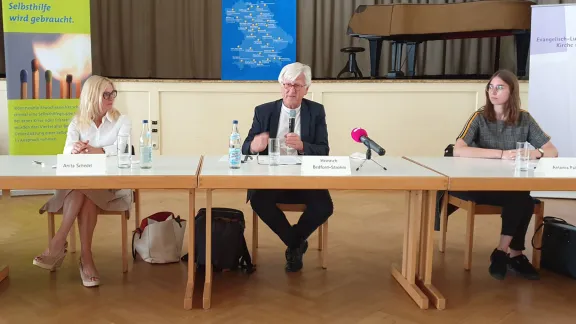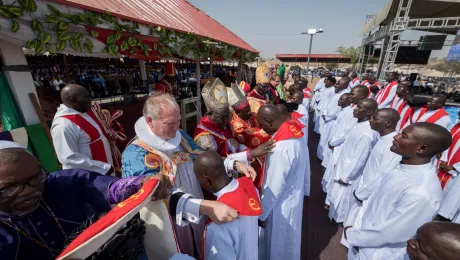
At the press conference for the launch of a network of self-help groups for people who lost someone to COVID-19: (from left) Anita Schedel, Bishop Heinrich Bedford-Strohm, Antonia Palmer. Photo: EKLB
Bishop Bedford-Strohm: “Healing lies in sharing the grief”
(LWI) – The Leading Bishop of the Evangelical Lutheran Church in Bavaria (EKLB), Heinrich Bedford-Strohm, has officially launched a network of self-help groups for relatives of people who have died of COVID-19 in Weiden, Germany.
“Strength lies in sharing, and healing lies in meeting others,” said Bedford-Strohm, who is also the Council President of the Evangelical Church in Germany (EKD). Two women who have already experienced the help and support of such self-help groups are Antonia Palmer and Anita Schedel.
Palmer lost her father to COVID-19 in January, and the student then founded Germany’s first online support group. “I wanted to come to terms with the loss and grief you experience as a relative of the more than 91,000 people who died of COVID-19 in our country,” Palmer said. It was also a way to collectively counteract claims from Coronavirus deniers, who sometimes make unfounded arguments to relatives, she added.
Anita Schedel mourns the death of her husband, a professor and medical doctor who ran a clinic. She now intends to establish a self-help group in Munich. “I know from my own experience how good it is to be able to exchange ideas with others. A similar fate not only connects people; you understand and feel understood, especially when the pandemic is just numbers and incidences for the world around you, and large parts of daily life sink into normality.”
Mourners who have lost dear ones to COVID-19 have a tough time, Bedford-Strohm said at the launch at the end of July. The church, with its many pastoral care services, already offers support to those affected. Self-help groups are an additional, constructive way of going through grief together with other people who have suffered a similar fate. In these groups, he said, something of Jesus’ attitude becomes visible: “Bear one another’s burdens” (Galatians 6:2).
“The situation of people grieving their relatives has been a concern since the beginning of the pandemic,” Bedford-Strohm said. Self-help groups offer a constructive way of grieving together with people who have suffered a similar fate, he said. A network of self-help groups is now being established to meet this need for the entire German state of Bavaria. For this work, the EKLB collaborates with other civil society institutions and church and diaconal actors.
Through this network, mourners can currently turn to 34 contact points. There, people are brought together regionally and, if desired, supported in founding a new group locally. In Weiden, the cooperation is already functioning in an exemplary manner, according to the regional bishop.
During the Coronavirus pandemic, the city of Weiden and surrounding region had become a hot spot, reported the Dean of Weiden, Thomas Guba. “Professionals and volunteers were pushed to their limits during this time – and sometimes beyond.” Each person processed this time differently, the dean continued. “As church and diaconal agencies, it is our task to help people and to create a framework for people to exchange ideas and find their way back to each other: meeting and talking is enormously important. In addition to self-help groups, we also invite people to deal with the pandemic through new actions and initiatives.”
By LWF/A. Weyermüller


